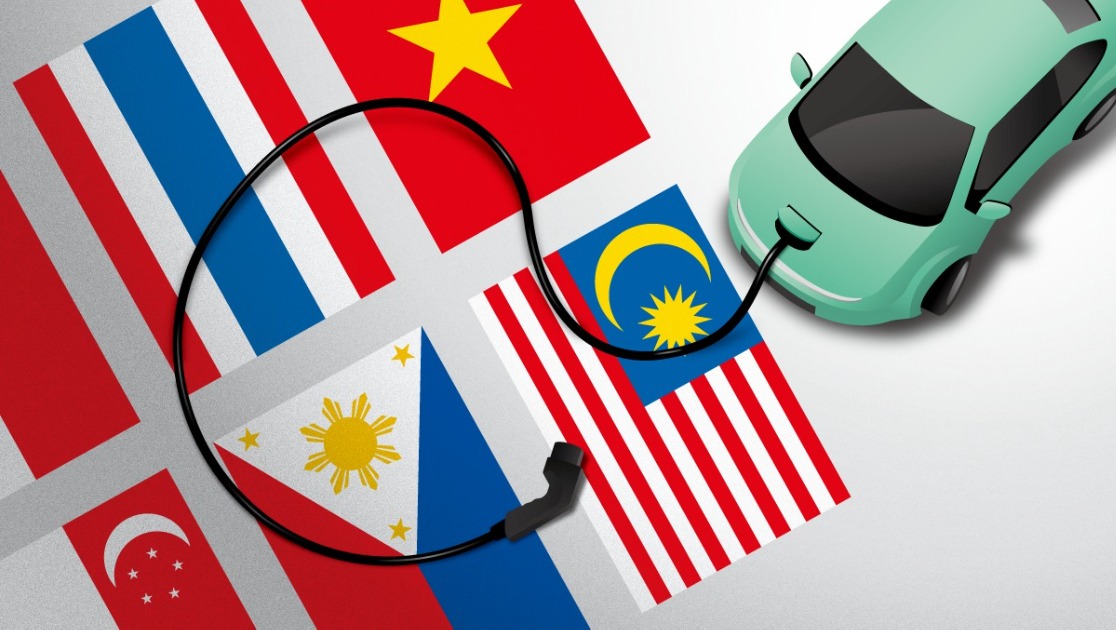Southeast Asia (SEA) is on the front line of climate challenges — not only is it vulnerable to climate change, but it is also recording rapid growth in emissions due to the rapid industrialisation of emerging economies.
Recognising the need for a greener economy, governments in SEA, with the exception of the Philippines, have pledged to achieve net-zero targets by 2050.
One of the ways to accelerate this goal is to phase out internal combustion engine (ICE) vehicles and replace them with electric ones.
For SEA, this presents a win-win solution. That is because, other than lowering emissions, the shift towards electric vehicles (EVs) will help to fuel the growth of SEA as a potential market and manufacturing hub for EVs.
The electrification of Southeast Asia

Governments in the region have introduced ambitious targets to drive EV growth, which is the first step towards transport electrification.
Besides Singapore’s very own Green Plan 2030 to stop the sale of petrol and diesel cars by 2030, Thailand has a 30@30 goal to raise the proportion of EVs to 30 per cent of all domestic vehicle production by 2030.
Meanwhile, Malaysia wants 38 per cent of vehicle sales to be EVs by 2040. And Indonesia, the largest economy in SEA, aims to sell only electric-powered cars and motorbikes by 2050.

To meet these goals, governments have dangled various tax incentives to make EVs more affordable. In addition, there is also a scramble to install sufficient charging stations to overcome range anxiety.
Malaysia, for instance, wants to install 10,000 charging points by 2025 as part of its low-carbon mobility blueprint. This should come as good news for EV drivers in Singapore who do not have to worry about getting stuck in the future.
On the supply side, EVs with mass-market pricing are on the horizon for millions of consumers.
Besides domestically produced electric motorbikes in Malaysia, Vietnam, Thailand, and Indonesia, Chinese manufacturers are beginning to bring low-cost EV models into the SEA market.
Great Wall Motor is selling several EVs in Thailand for under US$30,000. Another automaker, Wuling Motors, has introduced an EV priced at US$16,000 in Indonesia. Prices for these EVs are competitive and on par with their ICE counterparts.
It will not be long before SEA is flooded with cheap EV models. Just like Chinese mobile phones, there will be something for everyone.
Singapore – The model city for EVs

A combination of push and pull factors have conspired together to make SEA an attractive market for EVs, and at the heart of it is Singapore.
As an early adopter of green technologies, Singapore is well positioned to provide other SEA countries with a blueprint for decarbonising the economy and EV adoption.
Surging ahead with its charging infrastructure, Singapore plans to build 60,000 charging points to be dotted all over the island by 2030.
While often seen as a “chicken and egg” debate, Singapore has taken a gamble with developing EV infrastructure and basing it on the assumption that demand will take off.
This display of political will is, in fact, a crucial ingredient in becoming an EV-ready city. Being a technological hub, Singapore is also shaping itself into a world-class EV ecosystem with a range of market opportunities.
As charging one’s vehicle becomes a way of life, plenty of auxiliary services have popped up to make the process easier, less time-consuming and more convenient.
And despite lacking the space and raw materials to be part of the EV supply chain, Singapore is making up for it by focusing on battery recycling, an industry still in its infancy.
TES B, a battery recycling facility that can extract more than 90 per cent of precious metals from spent batteries was set up last year.
In addition, startups such as GenPlus and NEU Battery Materials have developed innovative solutions to solve the problematic nature of disposing of EV batteries.
With its progressive infrastructure and dedication to sustainable technology, it is no surprise that Singapore is at the vanguard and an inspiration for the regional shift towards EVs.
Featured Image Credit: Hiroko Oshima via Nikkei Asia








